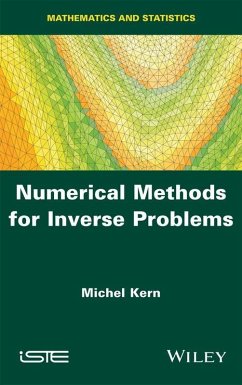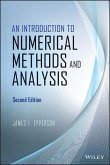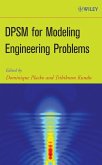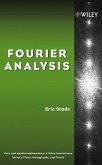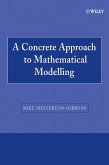Numerical Methods for Inverse Problems (eBook, PDF)


Alle Infos zum eBook verschenken

Numerical Methods for Inverse Problems (eBook, PDF)
- Format: PDF
- Merkliste
- Auf die Merkliste
- Bewerten Bewerten
- Teilen
- Produkt teilen
- Produkterinnerung
- Produkterinnerung

Hier können Sie sich einloggen

Bitte loggen Sie sich zunächst in Ihr Kundenkonto ein oder registrieren Sie sich bei bücher.de, um das eBook-Abo tolino select nutzen zu können.
This book studies methods to concretely address inverse problems. An inverse problem arises when the causes that produced a given effect must be determined or when one seeks to indirectly estimate the parameters of a physical system. The author uses practical examples to illustrate inverse problems in physical sciences. He presents the techniques and specific methods chosen to solve inverse problems in a general domain of application, choosing to focus on a small number of methods that can be used in most applications. This book is aimed at readers with a mathematical and scientific computing…mehr
- Geräte: PC
- mit Kopierschutz
- eBook Hilfe
- Größe: 2.68MB
![An Introduction to Numerical Methods and Analysis (eBook, PDF) An Introduction to Numerical Methods and Analysis (eBook, PDF)]() James F. EppersonAn Introduction to Numerical Methods and Analysis (eBook, PDF)106,99 €
James F. EppersonAn Introduction to Numerical Methods and Analysis (eBook, PDF)106,99 €![Numerical Methods for Ordinary Differential Equations (eBook, PDF) Numerical Methods for Ordinary Differential Equations (eBook, PDF)]() J. C. ButcherNumerical Methods for Ordinary Differential Equations (eBook, PDF)89,99 €
J. C. ButcherNumerical Methods for Ordinary Differential Equations (eBook, PDF)89,99 €![DPSM for Modeling Engineering Problems (eBook, PDF) DPSM for Modeling Engineering Problems (eBook, PDF)]() Dominique PlackoDPSM for Modeling Engineering Problems (eBook, PDF)159,99 €
Dominique PlackoDPSM for Modeling Engineering Problems (eBook, PDF)159,99 €![Fourier Analysis (eBook, PDF) Fourier Analysis (eBook, PDF)]() Eric StadeFourier Analysis (eBook, PDF)156,99 €
Eric StadeFourier Analysis (eBook, PDF)156,99 €![Theoretical Fluid Dynamics (eBook, PDF) Theoretical Fluid Dynamics (eBook, PDF)]() Bhimsen K. ShivamoggiTheoretical Fluid Dynamics (eBook, PDF)199,99 €
Bhimsen K. ShivamoggiTheoretical Fluid Dynamics (eBook, PDF)199,99 €![A Concrete Approach to Mathematical Modelling (eBook, PDF) A Concrete Approach to Mathematical Modelling (eBook, PDF)]() Mike Mesterton-GibbonsA Concrete Approach to Mathematical Modelling (eBook, PDF)135,99 €
Mike Mesterton-GibbonsA Concrete Approach to Mathematical Modelling (eBook, PDF)135,99 €![Spatial Ecology via Reaction-Diffusion Equations (eBook, PDF) Spatial Ecology via Reaction-Diffusion Equations (eBook, PDF)]() Stephen CantrellSpatial Ecology via Reaction-Diffusion Equations (eBook, PDF)191,99 €
Stephen CantrellSpatial Ecology via Reaction-Diffusion Equations (eBook, PDF)191,99 €-
-
-
Dieser Download kann aus rechtlichen Gründen nur mit Rechnungsadresse in A, B, BG, CY, CZ, D, DK, EW, E, FIN, F, GR, HR, H, IRL, I, LT, L, LR, M, NL, PL, P, R, S, SLO, SK ausgeliefert werden.
- Produktdetails
- Verlag: John Wiley & Sons
- Seitenzahl: 240
- Erscheinungstermin: 31. März 2016
- Englisch
- ISBN-13: 9781119136958
- Artikelnr.: 44872903
- Verlag: John Wiley & Sons
- Seitenzahl: 240
- Erscheinungstermin: 31. März 2016
- Englisch
- ISBN-13: 9781119136958
- Artikelnr.: 44872903
- Herstellerkennzeichnung Die Herstellerinformationen sind derzeit nicht verfügbar.
Part 1 Introduction and Examples 1
Chapter 1 Overview of Inverse Problems 3
1.1. Direct and inverse problems 3
1.2. Well-posed and ill-posed problems 4
Chapter 2 Examples of Inverse Problems 9
2.1. Inverse problems in heat transfer 10
2.2. Inverse problems in hydrogeology 13
2.3. Inverse problems in seismic exploration 16
2.4. Medical imaging 21
2.5. Other examples 25
Part 2 Linear Inverse Problems 29
Chapter 3 Integral Operators and Integral Equations 31
3.1. Definition and first properties 31
3.2. Discretization of integral equations 36
3.2.1. Discretization by quadrature-collocation 36
3.2.2. Discretization by the Galerkin method 39
3.3. Exercises 42
Chapter 4 Linear Least Squares Problems - Singular Value Decomposition 45
4.1. Mathematical properties of least squares problems 45
4.1.1. Finite dimensional case 50
4.2. Singular value decomposition for matrices 52
4.3. Singular value expansion for compact operators 57
4.4. Applications of the SVD to least squares problems 60
4.4.1. The matrix case 60
4.4.2. The operator case 63
4.5. Exercises 65
Chapter 5 Regularization of Linear Inverse Problems 71
5.1. Tikhonov's method 72
5.1.1. Presentation 72
5.1.2. Convergence 73
5.1.3. The L-curve 81
5.2. Applications of the SVE 83
5.2.1. SVE and Tikhonov's method 84
5.2.2. Regularization by truncated SVE 85
5.3. Choice of the regularization parameter 88
5.3.1. Morozov's discrepancy principle 88
5.3.2. The L-curve 91
5.3.3. Numerical methods 92
5.4. Iterative methods 94
5.5. Exercises 98
Part 3 Nonlinear Inverse Problems 103
Chapter 6 Nonlinear Inverse Problems - Generalities 105
6.1. The three fundamental spaces 106
6.2. Least squares formulation 111
6.2.1. Difficulties of inverse problems 114
6.2.2. Optimization, parametrization, discretization 114
6.3. Methods for computing the gradient - the adjoint state method 116
6.3.1. The finite difference method 116
6.3.2. Sensitivity functions 118
6.3.3. The adjoint state method 119
6.3.4. Computation of the adjoint state by the Lagrangian 120
6.3.5. The inner product test 123
6.4. Parametrization and general organization 123
6.5. Exercises 125
Chapter 7 Some Parameter Estimation Examples 127
7.1. Elliptic equation in one dimension 127
7.1.1. Computation of the gradient 128
7.2. Stationary diffusion: elliptic equation in two dimensions 129
7.2.1. Computation of the gradient: application of the general method 132
7.2.2. Computation of the gradient by the Lagrangian 134
7.2.3. The inner product test 135
7.2.4. Multiscale parametrization 135
7.2.5. Example 136
7.3. Ordinary differential equations 137
7.3.1. An application example 144
7.4. Transient diffusion: heat equation 147
7.5. Exercises 152
Chapter 8 Further Information 155
8.1. Regularization in other norms 155
8.1.1. Sobolev semi-norms 155
8.1.2. Bounded variation regularization norm 157
8.2. Statistical approach: Bayesian inversion 157
8.2.1. Least squares and statistics 158
8.2.2. Bayesian inversion 160
8.3. Other topics 163
8.3.1. Theoretical aspects: identifiability 163
8.3.2. Algorithmic differentiation 163
8.3.3. Iterative methods and large-scale problems 164
8.3.4. Software 164
Appendices 167
Appendix 1 169
Appendix 2 183
Appendix 3 193
Bibliography 205
Index 213
Part 1 Introduction and Examples 1
Chapter 1 Overview of Inverse Problems 3
1.1. Direct and inverse problems 3
1.2. Well-posed and ill-posed problems 4
Chapter 2 Examples of Inverse Problems 9
2.1. Inverse problems in heat transfer 10
2.2. Inverse problems in hydrogeology 13
2.3. Inverse problems in seismic exploration 16
2.4. Medical imaging 21
2.5. Other examples 25
Part 2 Linear Inverse Problems 29
Chapter 3 Integral Operators and Integral Equations 31
3.1. Definition and first properties 31
3.2. Discretization of integral equations 36
3.2.1. Discretization by quadrature-collocation 36
3.2.2. Discretization by the Galerkin method 39
3.3. Exercises 42
Chapter 4 Linear Least Squares Problems - Singular Value Decomposition 45
4.1. Mathematical properties of least squares problems 45
4.1.1. Finite dimensional case 50
4.2. Singular value decomposition for matrices 52
4.3. Singular value expansion for compact operators 57
4.4. Applications of the SVD to least squares problems 60
4.4.1. The matrix case 60
4.4.2. The operator case 63
4.5. Exercises 65
Chapter 5 Regularization of Linear Inverse Problems 71
5.1. Tikhonov's method 72
5.1.1. Presentation 72
5.1.2. Convergence 73
5.1.3. The L-curve 81
5.2. Applications of the SVE 83
5.2.1. SVE and Tikhonov's method 84
5.2.2. Regularization by truncated SVE 85
5.3. Choice of the regularization parameter 88
5.3.1. Morozov's discrepancy principle 88
5.3.2. The L-curve 91
5.3.3. Numerical methods 92
5.4. Iterative methods 94
5.5. Exercises 98
Part 3 Nonlinear Inverse Problems 103
Chapter 6 Nonlinear Inverse Problems - Generalities 105
6.1. The three fundamental spaces 106
6.2. Least squares formulation 111
6.2.1. Difficulties of inverse problems 114
6.2.2. Optimization, parametrization, discretization 114
6.3. Methods for computing the gradient - the adjoint state method 116
6.3.1. The finite difference method 116
6.3.2. Sensitivity functions 118
6.3.3. The adjoint state method 119
6.3.4. Computation of the adjoint state by the Lagrangian 120
6.3.5. The inner product test 123
6.4. Parametrization and general organization 123
6.5. Exercises 125
Chapter 7 Some Parameter Estimation Examples 127
7.1. Elliptic equation in one dimension 127
7.1.1. Computation of the gradient 128
7.2. Stationary diffusion: elliptic equation in two dimensions 129
7.2.1. Computation of the gradient: application of the general method 132
7.2.2. Computation of the gradient by the Lagrangian 134
7.2.3. The inner product test 135
7.2.4. Multiscale parametrization 135
7.2.5. Example 136
7.3. Ordinary differential equations 137
7.3.1. An application example 144
7.4. Transient diffusion: heat equation 147
7.5. Exercises 152
Chapter 8 Further Information 155
8.1. Regularization in other norms 155
8.1.1. Sobolev semi-norms 155
8.1.2. Bounded variation regularization norm 157
8.2. Statistical approach: Bayesian inversion 157
8.2.1. Least squares and statistics 158
8.2.2. Bayesian inversion 160
8.3. Other topics 163
8.3.1. Theoretical aspects: identifiability 163
8.3.2. Algorithmic differentiation 163
8.3.3. Iterative methods and large-scale problems 164
8.3.4. Software 164
Appendices 167
Appendix 1 169
Appendix 2 183
Appendix 3 193
Bibliography 205
Index 213
